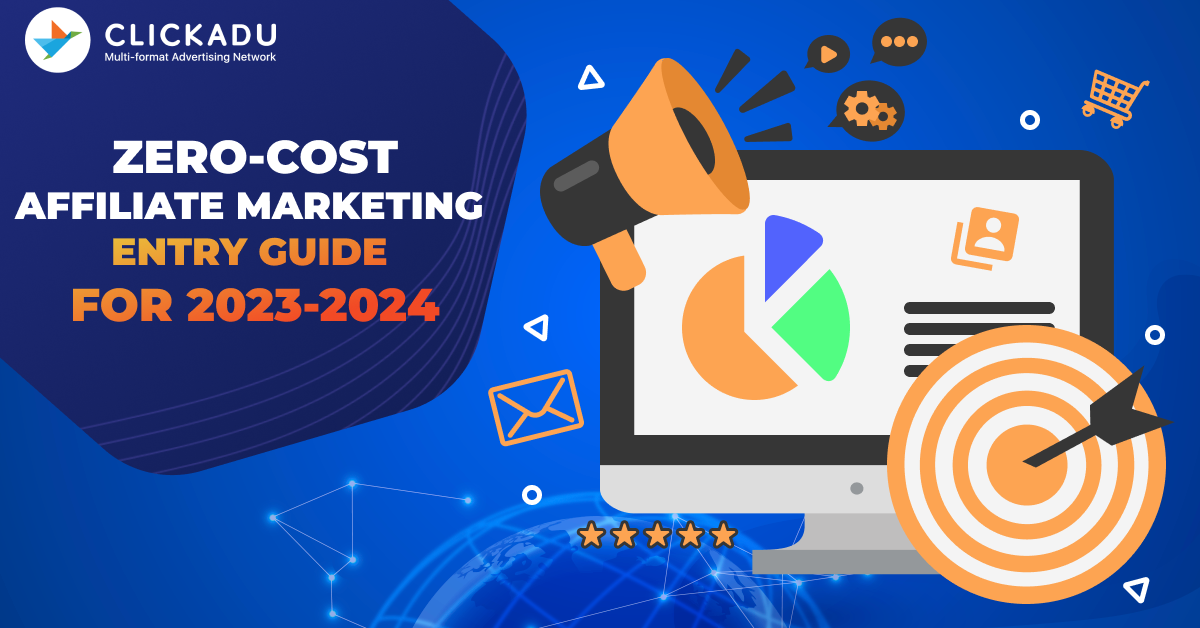
How To Start Affiliate Marketing With No Money In 2023-2024
- 4.12.2023
- 1205
- 10 min


In affiliate marketing, opportunity beckons, and barriers are few. In this industry, there’s a fundamental truth that aspiring affiliates must grasp: time is indeed money. While the notion of embarking on your affiliate marketing journey with little to no financial investment is undeniably enticing, there’s a caveat that looms—minimizing your upfront expenditure translates to an increased investment in time. Read further to learn more about the topic.
Affiliate marketing is a marketing strategy where affiliates earn commissions by promoting services or products from other companies. Here’s how it works:
Affiliate marketing offers a unique opportunity for individuals to enter the world of online entrepreneurship with minimal investment. Here’s how you can successfully begin your affiliate marketing journey without breaking the bank.
Selecting the right niche is a fundamental step in your affiliate marketing endeavor. Opt for a niche that you are genuinely passionate about and possess some expertise in. Your enthusiasm and knowledge will shine through in your content, making it more engaging and appealing to your target audience.
To establish your online presence, you’ll need a platform to share your content. Consider starting a blog using platforms like WordPress or Blogger, or utilize social media networks like Instagram or Facebook. These platforms offer a cost-effective way to create and share content.
Many affiliate programs are free to join, making it accessible for anyone interested in affiliate marketing. Explore and research affiliate programs related to your niche. These programs provide you with a wide array of products and services to promote, along with affiliate tracking links to record your referrals and commissions.
Your content should be informative, engaging, and highly relevant to your chosen niche. Craft content that offers value to your audience, like product reviews, how-to guides, or informative articles. The primary target is to provide solutions and information that your audience seeks.
The integration of affiliate products into your content is key to your success. Embed your affiliate links seamlessly within your content, avoiding any aggressive or spammy promotional tactics. Focus on delivering valuable information and guiding your audience rather than simply selling.
Free marketing channels can be a powerful ally in your affiliate marketing efforts. Social media platforms, including Facebook, Twitter, and Instagram, offer vast audiences that you can tap into. Join relevant groups and communities to connect with potential customers. Additionally, you can use free email marketing tools like MailChimp or MailerLite to build and maintain an email list, which will help you nurture relationships with your audience.
Here are the steps that you need to follow to start your journey.
While it’s entirely possible to start affiliate marketing with no money, having a small budget can significantly enhance your efforts and potentially accelerate your path to success. Here are some additional steps you can take if you’re willing to invest about $100 or less in your affiliate marketing venture:
If you’re serious about affiliate marketing, consider purchasing a domain and hosting for your website. This provides you with a more professional and customizable platform to host your content. While there are free blogging platforms, having your own domain lends credibility and control over your online presence.
Investing in a keyword research tool can help you identify high-demand, low-competition keywords in your niche. This valuable information can guide your content creation and search engine optimization (SEO) efforts, making it easier for your content to rank well on search engines.
If you’re using a self-hosted website, you may want to invest in premium themes or plugins to enhance your site’s functionality and appearance. While there are free options available, premium themes and plugins often offer more customization and features.
High-quality content is essential in affiliate marketing. Consider investing in content creation tools, such as graphic design software, stock image subscriptions, or grammar and spelling checkers. These tools can help you produce more appealing and error-free content.
Building an email list is a valuable asset for affiliate marketers. Email marketing services allow you to collect and manage subscribers, send automated campaigns, and nurture relationships with your audience.
With a budget of about $100, you can explore paid advertising options to drive more traffic to your affiliate content. Platforms like Google Ads, Facebook Ads, or sponsored posts on social media can help you reach a wider audience. Be cautious and start with a small budget until you gain experience.
Consider investing in affiliate marketing training courses or resources that can help you sharpen your skills and understand advanced affiliate strategies. There are both free and paid resources available, and the investment can pay off in the form of increased earnings.
Attend webinars, seminars, or conferences related to affiliate marketing. These events provide opportunities to network with industry experts, learn about emerging trends, and gain valuable insights that can benefit your affiliate marketing journey.
As your affiliate marketing efforts grow, it’s crucial to ensure you are in compliance with legal and regulatory requirements, such as disclosing your affiliate relationships. Consider consulting a legal expert or investing in legal compliance resources if needed.
Affiliate marketing, where the potential for success is high and the barriers to entry are low, is essential to recognize a fundamental truth: time is money. While the temptation of starting your affiliate marketing journey with zero financial investment is undoubtedly appealing, there’s a caveat that every aspiring affiliate marketer should understand—extra time is the cost you pay when you minimize your initial financial outlay.
Affiliate marketing is often praised for its accessibility. With little to no upfront costs, almost anyone can enter the field, and that’s part of its beauty. However, the flip side of the coin is that the more you minimize your initial financial investment, the more time and effort you’ll need to invest to see a stable and substantial income.
Here’s why this principle holds:
Affiliate marketing offers a low-cost entry point for entrepreneurs in 2023-2024. Partnerships with merchants through affiliate programs, promotion through free online platforms, and valuable content creation are the initial steps for starting with no money. However, it’s important to recognize that minimal upfront investment means more time and effort may be needed to see substantial income. Content creation, audience engagement, and the learning curve all require extra time. While time is a cost when minimizing financial investment, the potential for success in affiliate marketing is significant. Dedication, persistence, and a passion for sharing valuable content remain the keys to success in this dynamic field.
Affiliate income can be categorized into four groups: Novice – earning between $0 to $1,000 per month. Intermediate – generating $1,000 to $10,000 monthly. Proficient – achieving $10,000 to $100,000 per month.
The investment in affiliate marketing is on the rise, pointing towards increased payouts and escalated traffic costs in 2023. Anticipated growth in affiliate marketing for 2023 is set to drive higher advertiser budgets and more expansive campaigns.
The best product to promote in affiliate marketing often depends on your target audience and expertise. Insurance products and digital courses can offer substantial commissions and appeal to a broad audience. If you have a niche focus, products like jewelry, gaming products, or home automation products may be more lucrative and engaging for your specific audience.


Table of Contents